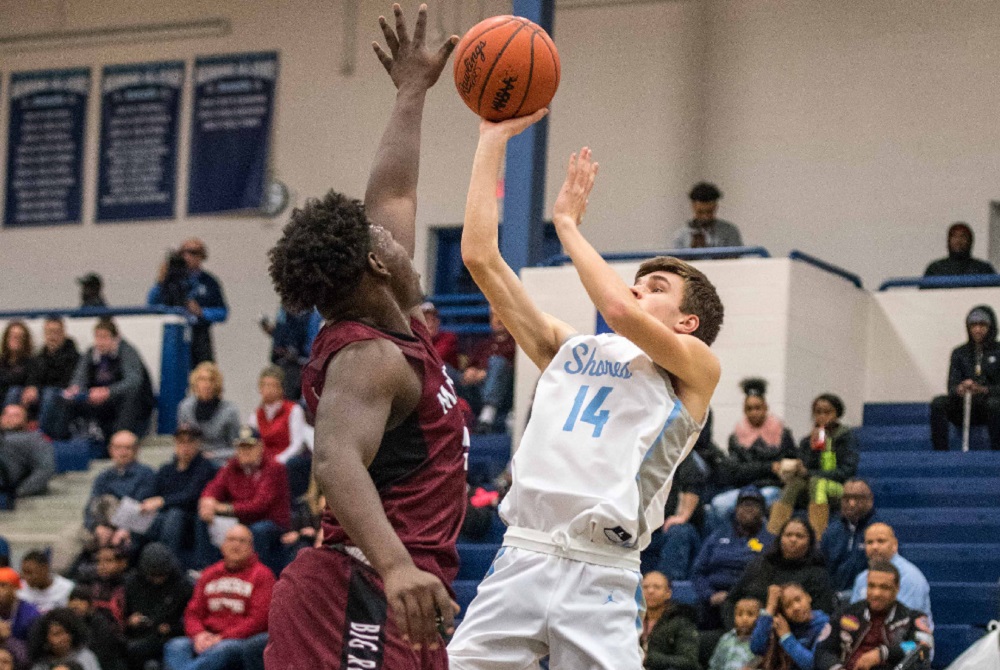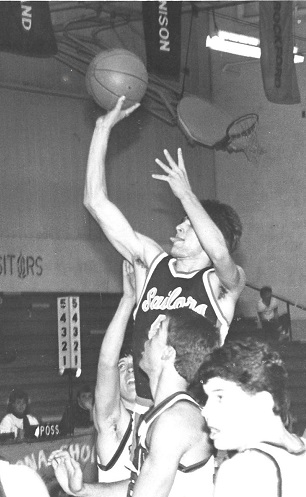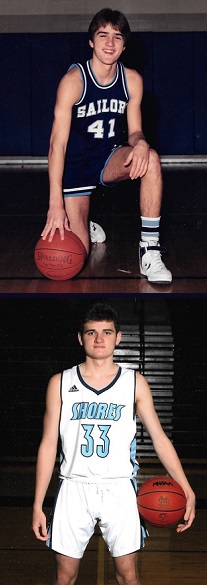
Detroit 'Longtime' Boys Coaches Down to Few
By
Tom Markowski
Special for Second Half
December 14, 2016
Gary Fralick considers himself one of the fortunate ones.
 Fralick, 66, is in his 32nd season as a head boys basketball coach. He retired from his teaching position in 2013. He started coaching at Redford Thurston in 1979, went to Royal Oak Kimball in 1984 and is in 23rd season as the head coach at Troy.
Fralick, 66, is in his 32nd season as a head boys basketball coach. He retired from his teaching position in 2013. He started coaching at Redford Thurston in 1979, went to Royal Oak Kimball in 1984 and is in 23rd season as the head coach at Troy.
Fralick might be lucky, but he is unquestionably rare. Fralick is believed to be one of three coaches in the Macomb/Oakland/Wayne area who has coached for more than 30 seasons.
There’s Dan Fife at Clarkston and Kevin Voss of Clinton Township Chippewa Valley, both of whom in their 35th seasons, all at the same school.
Another, Greg Esler at Warren DeLaSalle, is in his 30th season. He was the head coach at St. Clair Shores Lake Shore for seven seasons before going to DeLaSalle in 1994.
“We’re part of a dying breed,” Voss said.
It certainly appears so. Coaching longevity has taken on a different meaning recently. Twenty seems like a lot in these times, and in reality it is a long time. Twenty years or so ago, 20 years was normal. There’s a new normal, and 20 or 25 years isn’t it.
Many factors have contributed to this change. A person’s personal and family life often don’t coincide with the demands of coaching basketball. The responsibilities that come with coaching have increased. Some coaches say that to be an effective coach, it can be a 10- or 11-month job.
Two factors are at the forefront, and they are both financial. Coaches used to be educators as well as coaches. Yes, coaching can be viewed as teaching on the court, but at one time teaching in a classroom and coaching used to go hand in hand.
 Then there’s the subsidy coaches receive. It varies from school district to school district. Some make $4,000 a season, others can make $7,000. And it also costs money to run a program; unless the coach receives financial help from a booster club or parents, the money he or she receives begins to dwindle.
Then there’s the subsidy coaches receive. It varies from school district to school district. Some make $4,000 a season, others can make $7,000. And it also costs money to run a program; unless the coach receives financial help from a booster club or parents, the money he or she receives begins to dwindle.
But the most important factor is time.
“A tremendous amount of time is devoted to watching DVD or tapes,” Fralick said. “I know I’m dating myself with saying that. The point is, you’re watching a lot. There’s more scouting. And you don’t get paid much. Why don’t they stay as long as they used to? They get burned out. They want to spend more time with their families.
“You don’t see as many of the young coaches stay. Coaches don’t have the ambition to coach a long time. It’s not a profitable job. I don’t know what other coaches make. We used to compare what we made. Not anymore.
“Thirty years or more? I don’t see it happening. There’s the dual job thing. Things have changed. To me, it’s been a great job.”
To compensate for being away from home, Fralick brought his family with him. Sort of. He coached his son Gary, Jr., and Tim. Gary, a 1996 Troy graduate, played for his father his junior and senior seasons and Tim, a 1999 graduate, played four seasons on varsity. Fralick said he was even more fortunate to coach both on the same team (during the 1995-96 season).
Then there’s his wife, Sharon, who remains the scorekeeper.
“I’ve always had a passion for coaching and teaching,” Fralick said. “I love the game of basketball. I love the kids. There’s never a dull moment. It’s been a great ride.”
Vito Jordan has been around basketball all of his life. His father, Venias Jordan, was the boys head varsity coach at Detroit Mackenzie and Detroit Mumford before stepping down as a head coach only to return to the bench assisting his son the last six seasons.
Vito Jordan, 31, became a head coach at Detroit Osborn when he was 24. He started his coaching career the year before as an assistant to Henry Washington at Macomb College. Jordan went to Detroit Community after one season at Osborn and guided Community to its only MHSAA Finals appearance (Class B, 2013). He’s now in his fourth season as the head coach at Detroit Renaissance.
“I followed my father all of my life,” Jordan said. “I knew what I wanted to do when I was in college (Alma College). This is what I want to do the rest of my life.”
It’s different in Detroit. Schools close. Job titles change. Jordan, for instance, teaches at the Academy of Warren, a middle school in Detroit. It’s a charter school, not within the Detroit Public School system, therefore he receives his pay from two separate school systems (Renaissance is in the DPS).
There is a distinction. In some school systems coaches will receive a percentage – let’s say for argument sake, 10 percent – of their teaching salary to coach. Let’s say a person makes $60,000 a year to teach. He or she would then receive $6,000 to coach. If you coach two sports, that’s $12,000.
 Jordan is not privy to such a contract. Each job is separate. Jordan loves to coach, and he understands he must be a teacher to earn a decent living, and he’s content to continue on the path he is following. But he also knows that to make a good salary just coaching one must move on to the collegiate level like others have done.
Jordan is not privy to such a contract. Each job is separate. Jordan loves to coach, and he understands he must be a teacher to earn a decent living, and he’s content to continue on the path he is following. But he also knows that to make a good salary just coaching one must move on to the collegiate level like others have done.
“When there were coaches like my dad, Perry Watson (Detroit Southwestern), Johnny Goston (Detroit Pershing) and others, they all worked in the (Detroit Public) school system. Everyone was teaching. That was your career. None of them had aspirations of being a college coach. Not even Watson. Now everyone isn’t in the teaching profession. Maybe they do have a degree and maybe they don’t. The point is, most aren’t teachers. I can count on one hand those (in Detroit) who have their teaching certificate and coach.”
Jordan noted such successful PSL coaches like Derrick McDowell, Steve Hall and Robert Murphy who left high school to pursue a coaching career in college. Murphy guided Detroit Crockett to the Class B title in 2001 and is now the head coach at Eastern Michigan. McDowell has had two stints as a collegiate assistant coach, most recently at EMU. He’s since returned to coach at Detroit Western. Hall coached Detroit Rogers to three consecutive Class D titles (2003-05) before going to Duquesne University and Youngstown State as an assistant coach. Hall returned to Detroit last season and is in his second season as head coach at Detroit Cass Tech.
Jordan said they left high school to challenge themselves professionally, among other considerations. Voss said there are variables that influence how long a person lasts, in one school district or in coaching in general, that didn’t exist 20 years ago.
“Athletics have become pervasive in high school,” he said. “The whole booster situation you find in college is here. You can be winning but not winning enough. It’s a trickle down affect.
“Coaches complain about parents. Parents complain about playing time. High school sports is not as pure as it once was. Winning is way more important now. Now a coach comes in with a three-year window. You can have one or two down years, and the third you’d better win.
“Then there’s the pressure on your family. I’ve been lucky. My wife and I have had the players over for team dinners. We create a family atmosphere. It’s a change of society. I don’t envy the young coaches coming in.”
Community involvement has always been a priority for Voss. To keep a hand on the pulse, Voss heads the elementary basketball program within the Chippewa Valley school district. Games are held on Saturdays, and approximately 750 students take part.
“You have to have the right fit,” he said. “I’m in the right spot. You coach for different reasons when you get older. I’m enjoying the game. There’s a different level of satisfaction.”
 Tom Markowski is a columnist and directs website coverage for the State Champs! Sports Network. He previously covered primarily high school sports for the The Detroit News from 1984-2014, focusing on the Detroit area and contributing to statewide coverage of football and basketball. Contact him at [email protected] with story ideas for Oakland, Macomb and Wayne counties.
Tom Markowski is a columnist and directs website coverage for the State Champs! Sports Network. He previously covered primarily high school sports for the The Detroit News from 1984-2014, focusing on the Detroit area and contributing to statewide coverage of football and basketball. Contact him at [email protected] with story ideas for Oakland, Macomb and Wayne counties.
PHOTOS: (Top) Troy boys basketball coach Gary Fralick, left, is in his 32nd season coaching. (Middle) Detroit Renaissance boys coach Vito Jordan is following in the coaching footsteps of his father, Venias. (Below) Chippewa Valley boys coach Kevin Voss, left, is in his 35th season at his school. (Top and below photos courtesy of C&G Newspapers; middle photo courtesy of Detroit Public School League.)

Inspired by Dad, Southland Sons Give Shores Hoops 2nd-Generation Boost
By
Tom Kendra
Special for MHSAA.com
March 3, 2021
Drew and Jake Southland now have to help their struggling father onto the basketball court at Mona Shores.
 But they know it wasn’t too long ago that Scot Southland was carrying the load for the Sailors’ basketball program.
But they know it wasn’t too long ago that Scot Southland was carrying the load for the Sailors’ basketball program.
“People tell me all the time about how good he was,” Drew Southland said of his father, the all-time leading scorer in Mona Shores basketball history with 1,113 career points, who is now battling an even tougher opponent in multiple sclerosis.
“I try to live up to it. He is such an inspiration, with his positive attitude. I try not to complain about anything in my life, that’s for sure.”
Drew, a 6-foot-1 senior, and his team are having a difficult season so far, losing eight in a row before bolting out to a 38-6 halftime lead Tuesday and then cruising to a 64-41 win over visiting Grand Rapids Union. Drew scored a game-high 20 points for the Sailors (2-8).
Jake, a sophomore who is the same height as his brother at 6-1, is the leading scorer and rebounder for the Shores junior varsity, which evened its record at 5-5 on Tuesday, also with a win over GR Union. He scored a season-high 35 points in a loss against Whitehall on Feb. 20.
Win or lose, the Southland boys are always there for their dad, who turned 50 in January. Scot made first-team all-conference in the Ottawa-Kent Conference Red as both a junior and senior, graduating in 1989. He was also a two-time Muskegon Chronicle All-Area selection and averaged better than 20 points per game his senior year.
The first signs of his MS showed up during college, but the symptoms of the progressive nerve disease have become more pronounced in recent years, preventing him from working and even walking on his own. Drew and Jake are always there to help him in and out of his wheelchair and into the family’s van.
“I don’t mind it one bit,” said Jake. “I know he would be taking care of me if it was the other way around. My dad is so good to me and so supportive in everything, so helping him around is really the least I can do.”
Family affair
The Southland family is a fixture at all of Mona Shores’ home games.
Scot is always there at the end of the bleachers on the baseline, with his high school sweetheart and wife, Steffanie, close by his side. Other regulars, when tickets are available with COVID-19 restrictions, are his daughter Mason, his mother Joanne Southland and his mother-in-law Mary Golin.
 Joanne has been going to games at Mona Shores for years as her three boys – Ted, Kip and Scot – worked their way through the system. Kip was a standout basketball player, but his best sport was baseball, as he went on to start at shortstop for Central Michigan University during the mid-1980s and later played in the San Francisco Giants farm system.
Joanne has been going to games at Mona Shores for years as her three boys – Ted, Kip and Scot – worked their way through the system. Kip was a standout basketball player, but his best sport was baseball, as he went on to start at shortstop for Central Michigan University during the mid-1980s and later played in the San Francisco Giants farm system.
Scot started some varsity football games at quarterback, but of the three Southland boys, he was the one who left the biggest mark on the hardcourt.
He was a three-year varsity starter at a time when sophomores rarely started on the varsity, especially at a Class A school. As a junior, he led the Sailors to 13 wins and a rare District championship. As a senior, he became the first Mona Shores basketball player to score 1,000 points – a milestone that the humble, quiet standout wasn’t even cognizant of until after the fact.
“He is out there to set the best example he can,” then-Mona Shores coach John Adams told The Muskegon Chronicle in 1989 about Scot, his senior captain. “He is the All-American, apple pie kid. He’s the perfect role model for the program.”
The strong athletic genes run deep in the family, tracing back to Scot’s maternal grandfather Pete Petroskey, a welterweight boxer who won more than 180 professional fights. Petroskey went on to train some of the best boxers to ever come out of Muskegon, including Kenny Lane and Phil Baldwin, and was inducted into the Muskegon Area Sports Hall of Fame in 2002.
Scot’s athletic achievements continued after high school, as he led the Muskegon Community College basketball team to a runner-up finish at the junior college national tournament in 1990. He later walked on to the University of Arizona football team and made the roster as a backup quarterback.
Scot did some coaching when his kids were younger, but his disease has prevented him from coaching in recent years. He is now the No. 1 fan and encourager for Drew and Jake, as well as Mason, who is having a good year for the Mona Shores eighth-grade girls basketball team.
“The Southland family is very special to Mona Shores basketball,” explained Mona Shores varsity coach Brad Kurth, who missed two games after the death of his mother but returned to guide the Sailors to victory Tuesday night. “Drew and Jake are everything that you can ask for as a coach. They just compete. They go out and give you everything that they have.”
Different perspective
The Mona Shores athletic program has changed drastically since the late 1980s when Scot Southland was leading the Sailors in football and basketball.
Back then, the Sailors struggled to win any games on the football field, but were highly competitive with the likes of Muskegon and Grand Haven in basketball. Now, the Sailors rarely lose a football game and basketball has been looking up at those aforementioned programs over the past 10 years.
 Perhaps no single player has been more affected by the unsettled basketball program as Drew, who has had a different varsity head coach in each of his four years at the high school – as the program has had six head coaches over the past eight years.
Perhaps no single player has been more affected by the unsettled basketball program as Drew, who has had a different varsity head coach in each of his four years at the high school – as the program has had six head coaches over the past eight years.
“It’s been hard with the different coaches, but I hate making excuses,” said Drew, one of just four seniors on the Shores roster. “We can play much better than we have.”
Through it all, Drew has worked tirelessly to improve his game, waking up early to come in and shoot almost every morning, and still hopes to play college basketball.
Jake, who plays wide receiver and defensive back for the Shores football team and was moved up to the varsity for the team’s recent Division 2 championship run, hopes to be part of a basketball resurgence at Shores over the next two years.
The Sailors have plenty of height and youth on their front line in juniors Donovan Russell (6-8) and Ethan Krueger (6-6) and sophomore Parker Swartz (6-4). With Jake and many other talented players set to move up to the varsity full-time next year, he is hoping to engineer a basketball breakthrough – much like his father did during his junior year of high school.
Jake turned some heads when he got moved up to the varsity for Saturday’s game against Wyoming. In less than two minutes of action, he scored five points and grabbed two rebounds.
“Drew and Jake just love to be out on the basketball court,” said Mona Shores junior varsity coach Tyler VanBergen. “The love that their dad has for the game flows through the whole family.”
Love for the game of basketball, along with humility and a strong work ethic, are not the only gifts Scot has given to his children.
Watching their father handle his illness with grace and a positive attitude – while never wallowing in self-pity or taking his frustrations out on them – has given all three of them a perspective on life which most kids their age simply don’t have.
“I’ve learned from watching him that life isn’t fair,” Jake said. “I mean, I would love to be able to play 1-on-1 against him, but instead we have to do other things. We watch a lot of movies together and talk about them. Doing that with him has really given me a passion for movies, and I’d love to work in film or directing someday.”
 Tom Kendra worked 23 years at The Muskegon Chronicle, including five as assistant sports editor and the final six as sports editor through 2011. E-mail him at [email protected] with story ideas for Muskegon, Oceana, Mason, Lake, Oceola, Mecosta and Newaygo counties.
Tom Kendra worked 23 years at The Muskegon Chronicle, including five as assistant sports editor and the final six as sports editor through 2011. E-mail him at [email protected] with story ideas for Muskegon, Oceana, Mason, Lake, Oceola, Mecosta and Newaygo counties.
PHOTOS: (Top) Muskegon Mona Shores’ Drew Southland works to get up a shot during a game against Muskegon last season. (Middle) Scot Southland was a standout for Mona Shores before graduating in 1989. (Below) Scot, as a member of the Sailors, and younger son Jake who is playing this season on junior varsity. (Top photo courtesy of Local Sports Journal; additional photos courtesy of Southland family.)

